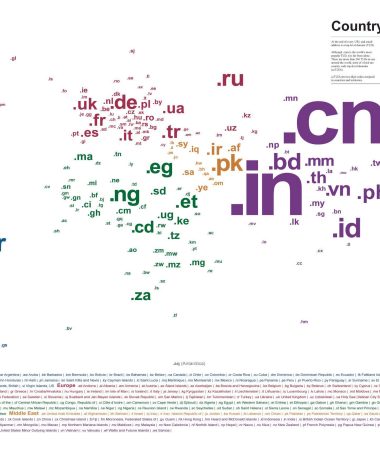The internet has a habit of breaking down borders. However, even as it globalizes the world, it has long had an English-language bias, particularly when it comes to domain names. Imagine trying to type a web address in your native script only to discover you’re limited to using a set of English characters.
Thankfully, this is a problem that Internationalized Domain Names (IDNs) aim to solve. In this article, we delve deep into what an Internationalized Domain Name is, its history, advantages, disadvantages, and its implications for the future of the web.
What is an Internationalized Domain Name (IDN)?
An Internationalized Domain Name (IDN) is a domain name that contains non-ASCII (American Standard Code for Information Interchange) characters. In simpler terms, it allows the usage of a more comprehensive set of characters that are not limited to the English alphabet, numerals, or hyphens. This includes characters with diacritical marks (like é, ü), non-Latin scripts (such as Cyrillic, Arabic, or Chinese), and various other alphabets.
Traditional domain names were limited to ASCII characters to ensure uniformity and ease of use. However, this limitation posed significant challenges for non-English speaking populations, particularly those using different scripts. IDNs were developed to overcome this limitation.
Historical Overview
The concept of IDNs was brought into public discourse in the early 2000s, spearheaded by the Internet Engineering Task Force (IETF). The IETF released a set of protocols known as the ‘Punycode,’ which serves as the backbone for IDNs.
Punycode allows the translation of Unicode characters into a format that can be understood by the Domain Name System (DNS), which is still primarily ASCII-based. The Internet Corporation for Assigned Names and Numbers (ICANN) further legitimized the use of IDNs when it adopted the IDNA (Internationalizing Domain Names in Applications) standard in 2003.
Advantages of IDNs
Accessibility
IDNs make the internet more accessible to billions of people who do not natively speak English. It enables a more inclusive digital experience, allowing users to navigate and interact with the web in their native languages.
Cultural Identity
For businesses and individuals alike, IDNs provide a way to express cultural identity. It helps local businesses appeal better to local markets by using names and terms that are familiar and easily remembered.
SEO and Marketing
Localized domain names can improve search engine optimization (SEO) for queries in local languages, making it a valuable marketing tool.
Disadvantages of IDNs
Complexity
IDNs can introduce complexities in web configurations and applications. For example, email systems still have trouble recognizing email addresses that employ IDNs, making their utility incomplete.
Phishing Risks
The use of similar-looking characters from different scripts can lead to phishing attacks. An attacker can register a domain that looks almost identical to a legitimate site to trick users into revealing sensitive information.
Limited Awareness
Not everyone is aware of the existence or benefits of IDNs, leading to limited adoption. This is gradually changing, but it remains a challenge for mainstream usage.
The Future of IDNs
With ongoing advancements in machine learning and language processing technologies, IDNs are set to become more sophisticated and user-friendly. ICANN and other regulatory bodies continue to explore solutions to the existing challenges posed by IDNs, such as phishing and complexity.
Moreover, the increasing globalization of the internet economy means that IDNs will become increasingly crucial for local businesses seeking to expand internationally. As we continue to push towards a more inclusive and global internet, IDNs will undoubtedly play a vital role in shaping that landscape.
Internationalized Domain Names (IDNs) are not just a technological advance; they are a significant step towards a more inclusive global community. By breaking down the language barriers that have long restricted non-English speakers, IDNs make the internet a space for everyone. Although there are challenges to overcome, the future looks bright for this transformative technology.
IDN vs. ccTLDs: A Comparative Look
It’s essential to differentiate between IDNs and ccTLDs (Country Code Top-Level Domains) as both serve the international community but in different ways. While ccTLDs like .uk, .fr, or .jp signify a specific country or geographical region, they are still limited to ASCII characters. IDNs go a step further by allowing non-ASCII characters, letting users truly express domain names in their local scripts and dialects.
The Technical Aspects of IDNs: How They Work
IDNs function through a conversion process called “Punycode encoding,” which transforms the domain name’s Unicode characters into a string of ASCII text. When you enter an IDN into a web browser, the browser converts the Unicode text into Punycode, which is then resolved by the DNS to locate the associated web server and display the website.
For instance, the Unicode domain name “münchen.de” is converted into its Punycode equivalent “xn--mnchen-3ya.de” before querying the DNS. This process is seamless and transparent to the user, maintaining a user-friendly experience.
Policy and Regulation
ICANN plays a significant role in regulating IDNs to ensure that they meet international standards and to prevent any abuse or misuse, such as in the case of phishing attacks. Various initiatives and discussions are ongoing to further refine the policy concerning IDNs and enhance their safety and effectiveness.
Economic Implications
From an economic standpoint, IDNs can be a game-changer, particularly for developing countries. By making the internet more accessible and navigable for non-English speaking users, IDNs can catalyze online commerce in different parts of the world. Businesses can reach more customers in a language they understand, thereby increasing their market potential.
Cultural Implications
IDNs are not just about improved accessibility; they are also about preserving cultural heritage. As languages and dialects receive a new platform for expression, the internet becomes a more diverse and enriching place. IDNs may help in the documentation and survival of minority languages that are otherwise fading.
Challenges Ahead
Despite their benefits and the progress made so far, IDNs face several hurdles:
Universal Acceptance: Many internet applications and email systems still do not support IDNs or do so partially. This inconsistent acceptance limits the full potential of IDNs.
Consumer Awareness: Many people are unaware of the existence or value of IDNs, a fact that hampers their widespread adoption.
Cost: For businesses, migrating to an IDN can be an expensive affair, considering the changes needed in branding, SEO, and marketing strategies.
In a world that is increasingly interconnected yet diverse, the importance of Internationalized Domain Names cannot be overstated. They break down barriers, foster inclusivity, and pave the way for a richer, more accessible internet for all. While challenges remain, the work being done by organizations like ICANN and the broader tech community gives us reason to be optimistic about the future of IDNs.
As technology evolves, and as the push for a more inclusive internet gains momentum, it’s safe to say that IDNs will become increasingly integral to our online experience. Whether for economic growth, cultural preservation, or simply making the internet a space for everyone, IDNs have a critical role to play in shaping the internet of tomorrow.
20 Famous IDN Websites Across the Globe
Though the adoption of Internationalized Domain Names (IDNs) is not as widespread as ASCII domain names, several well-known websites have taken the initiative to employ IDNs for better localization and inclusivity. These examples demonstrate the diversity and reach of IDNs, providing valuable insights into how they are being used in various contexts.
- 北京大学.cn (Peking University, China)
The prestigious Peking University in China uses an IDN to make its website accessible to a Chinese-speaking audience.
- München.de (Munich, Germany)
The official website for the city of Munich uses an IDN to accurately reflect its name in the German script.
- Yandex.рф (Russia)
Yandex, a popular search engine in Russia, uses the .рф domain, which stands for Russian Federation in Cyrillic script.
- الجزيرة.net (Al Jazeera, Qatar)
Al Jazeera, the Qatari news organization, uses an Arabic script IDN for its network, broadening its reach in the Arab-speaking world.
- 三菱.com (Mitsubishi, Japan)
The multinational conglomerate Mitsubishi uses an IDN in Kanji to serve its native Japanese audience.
- संजीवगुप्ता.com (Sanjeev Gupta, India)
Sanjeev Gupta, a public figure in India, uses an IDN to display his name in Devanagari script.
- 游戏.cn (Games, China)
A popular gaming website in China uses this domain to attract a native audience.
- Björn.se (Sweden)
This Swedish website uses the character “ö,” which is common in Swedish but not in ASCII.
- рбк.ru (RBK, Russia)
A well-known media outlet in Russia uses the Cyrillic script for its domain name.
- ایران.ir (Iran)
The official government portal of Iran employs an IDN for better accessibility among its Persian-speaking populace.
- København.dk (Copenhagen, Denmark)
The Danish capital uses its native spelling in its official website’s domain name.
- Hürriyet.com.tr (Turkey)
A leading Turkish news website utilizes a Turkish character in its domain name.
- ΕΛΛΑΣ.gr (Greece)
The official tourism website of Greece uses the Greek script for its domain name to attract native visitors.
- 신한은행.kr (Shinhan Bank, South Korea)
Shinhan Bank employs a Korean script IDN for its South Korean operations.
- Laṣẹ.com.ng (Nigeria)
A Nigerian website uses Yoruba diacritical marks in its domain name.
- 16. Māori.nz (New Zealand)
A website dedicated to the Māori culture and language in New Zealand.
- فلسطين.ps (Palestine)
The State of Palestine uses an IDN for its official government portal.
- საქართველო.ge (Georgia)
The country of Georgia uses its native script for its official website.
- Монгол.mn (Mongolia)
The Mongolian government uses Cyrillic for its official portal.
- Führer.de (Germany)
Though not related to the historical figure, this German website uses an umlaut in its domain name.
These examples show that IDNs are more than a technical innovation; they’re a tool for fostering global inclusion and cultural diversity. They make the internet a place where people can express themselves in their native languages and scripts, deepening the connection between web users and the digital world. As we continue to globalize, IDNs will undoubtedly become an integral part of our online experience.











